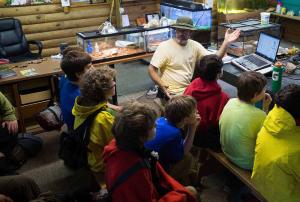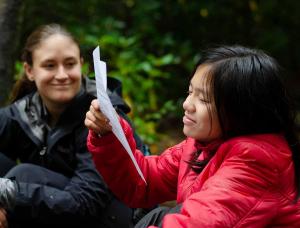'82.8% Report Continued Improvement': Struggling Students Achieve Academic Success at Trails Carolina
Trails Carolina's intentional transition model empowers struggling students with learning differences, leading to continuted academic improvement a year later.
According to the most recent results of an ongoing research initiative independently developed and overseen by the Center for Research, Assessment, and Treatment Efficacy (CReATE) and the University of Arkansas, 82.8% of students with learning differences who participated in Trails Carolina's transition-focused wilderness therapy program reported improvement in their academic performance 12 months after graduating from Trails.
These at-risk students showed continued improvement in their academic performance, with many showing significant gains in their grades and overall academic achievement and mental health.
“We’re thrilled to see the positive results of our transition model for students with learning differences,” said Jeremy Whitworth, Executive Director at Trails Carolina. “Our goal is to provide a comprehensive and supportive program that helps students successfully transition back to their home environments and continue to achieve academic and personal success long after Trails, and it's encouraging to see that the results are positive.”
The transitional model at Trails is designed to help students successfully transition back into their home, school, and community environments upon completing the Trails Carolina wilderness therapy program while maintaining the skills and coping mechanisms that they developed along the way.
While many traditional residential treatment centers save aftercare planning and transition skills for the end of the individual's stay, Trails intentionally incorporates opportunities for students to practice these skills consistently from the time they step foot on campus through graduation.
"It's the cyclical structure of Trails that really allows our students to benefit long-term," stated Whitworth. "Our transition cycle allows students to try something again, reflect on how it went the first time, and adjust their choices accordingly. They get to try the same skills in different environments, they get to test out new skills based in familiar environments, they get to reflect on what was successful and what wasn’t and try something different if they need to."
At Trails Carolina, students cycle between the wilderness setting and a more traditional residential setting throughout their time in the wilderness program.
Weeks 1 & 2 - The transition cycle begins with a two-week wilderness expedition led by trained, wilderness instructors. During these two weeks, students, in their peer groups and with their group leaders, backpack from campsite to campsite. Each day typically includes 2-6 miles of hiking, breaking down and setting up camp, cooking over a campfire, and team building. Students learn wilderness skills such as how to start, monitor, and safely extinguish a campfire, as well as teamwork skills as they collaborate with group members to hang tarps and pitch tents.
Week 3 - After the 2-week expedition, students return to the Sky Valley base camp where they spend one week. This base camp includes yurts, where students sleep instead of tents, shower houses, and an outdoor kitchen. At the Sky Valley basecamp, students have a more structured schedule that involves science class with Science Steve, traditional and experiential academics, and then they return to the same yurt at the end of each day.
Week 4 - Following Sky Valley, students experience the closest thing to their home schedules at the Winding Gap campus, where they sleep in cabins with bunks. During this phase, students participate in traditional academics in an indoor classroom complete with desks, chairs, and whiteboards. This most closely resembles the academic setting found in a therapeutic boarding school. Here, the kids also practice emotional regulation through Trails Carolina's equine relational therapy programming.
After completing one 4-week cycle, Trails Carolina students start the cycle again. By prioritizing wilderness therapy transitions, Trails Carolina's approach allows students to test their newfound skills such as healthy communication, anxiety and stress management, and maintaining focus in a mix of environments, which helps prepare them for the dynamic nature of everyday situations in the real world.
Many students who struggle with learning differences face challenges when transitioning between home, peer, and school environments. These challenges can involve maintaining focus and managing anxiety. Many even struggle to maintain academic focus in the 3-5 minute gap between classes on an average school day.
The transitional model at Trails Carolina is specifically designed to address these challenges.
In traditional treatment programs, students often get into a rhythm with a specific environment and certain individuals but fail to maintain that progress when returning home. Trails Carolina differs from these traditional treatment centers. The wilderness setting enhances opportunities to practice transitions, helps to increase the chances of long-term success upon returning home, and helps in building resilience.
Trails Carolina's transitional programming includes individualized academic support and coaching to help students navigate the challenges of the transition process. Students have access to a range of resources and tools to help them succeed academically and personally both during and after graduating from Trails.
The transition model at Trails also focuses on helping students build social-emotional skills and strengthen their relationships with parents, family members, teachers, and peers. The program includes parallel family programming and coaching to get parents involved in the process, as well as peer support and mentorship to help students with communication skills and healthy relationship building.
“At Trails, we believe that academic success is just one piece of the puzzle,” said Whitworth. “We’re committed to helping our students build the skills, self-confidence, and resilience they need to thrive in all areas of their lives.”
The transitional model at Trails Carolina is just one of the many therapeutic support services offered by the wilderness therapy program. Trails has been helping youth and families for over 15 years, providing a unique and effective approach to healing and growth from an expert team of therapists, clinicians, educators, and staff.
“Our team is dedicated to helping our students succeed and achieve their goals,” shared Whitworth. “We believe that every child has the potential to thrive, and we are committed to helping them discover and reach their full potential.”
Julia Andrick
Trails Carolina
+1 208-255-6920
email us here
Visit us on social media:
Facebook
Twitter
LinkedIn
Instagram
YouTube
Science Steve - Trails Carolina Science Center
Legal Disclaimer:
EIN Presswire provides this news content "as is" without warranty of any kind. We do not accept any responsibility or liability for the accuracy, content, images, videos, licenses, completeness, legality, or reliability of the information contained in this article. If you have any complaints or copyright issues related to this article, kindly contact the author above.



